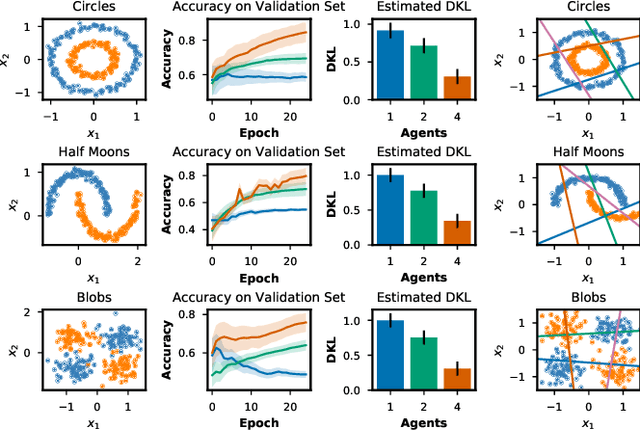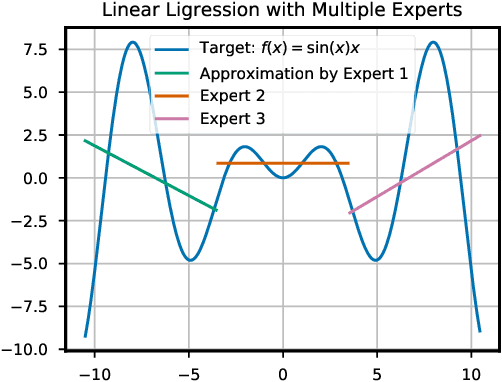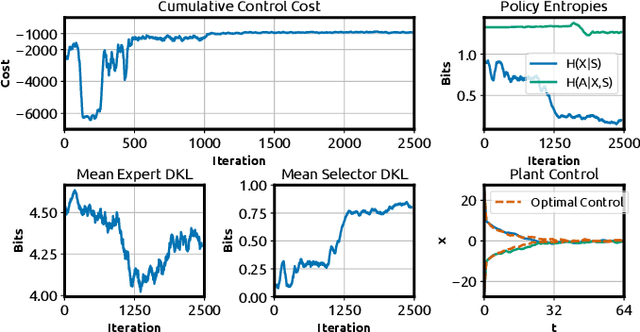Sebastian Gottwald
Automatic Bat Call Classification using Transformer Networks
Sep 20, 2023Abstract:Automatically identifying bat species from their echolocation calls is a difficult but important task for monitoring bats and the ecosystem they live in. Major challenges in automatic bat call identification are high call variability, similarities between species, interfering calls and lack of annotated data. Many currently available models suffer from relatively poor performance on real-life data due to being trained on single call datasets and, moreover, are often too slow for real-time classification. Here, we propose a Transformer architecture for multi-label classification with potential applications in real-time classification scenarios. We train our model on synthetically generated multi-species recordings by merging multiple bats calls into a single recording with multiple simultaneous calls. Our approach achieves a single species accuracy of 88.92% (F1-score of 84.23%) and a multi species macro F1-score of 74.40% on our test set. In comparison to three other tools on the independent and publicly available dataset ChiroVox, our model achieves at least 25.82% better accuracy for single species classification and at least 6.9% better macro F1-score for multi species classification.
The Two Kinds of Free Energy and the Bayesian Revolution
Apr 24, 2020



Abstract:The concept of free energy has its origins in 19th century thermodynamics, but has recently found its way into the behavioral and neural sciences, where it has been promoted for its wide applicability and has even been suggested as a fundamental principle of understanding intelligent behavior and brain function. We argue that there are essentially two different notions of free energy in current models of intelligent agency, that can both be considered as applications of Bayesian inference to the problem of action selection: one that appears when trading off accuracy and uncertainty based on a general maximum entropy principle, and one that formulates action selection in terms of minimizing an error measure that quantifies deviations of beliefs and policies from given reference models. The first approach provides a normative rule for action selection in the face of model uncertainty or when information-processing capabilities are limited. The second approach directly aims to formulate the action selection problem as an inference problem in the context of Bayesian brain theories, also known as Active Inference in the literature. We elucidate the main ideas and discuss critical technical and conceptual issues revolving around these two notions of free energy that both claim to apply at all levels of decision-making, from the high-level deliberation of reasoning down to the low-level information-processing of perception.
An Information-theoretic On-line Learning Principle for Specialization in Hierarchical Decision-Making Systems
Jul 26, 2019



Abstract:Information-theoretic bounded rationality describes utility-optimizing decision-makers whose limited information-processing capabilities are formalized by information constraints. One of the consequences of bounded rationality is that resource-limited decision-makers can join together to solve decision-making problems that are beyond the capabilities of each individual. Here, we study an information-theoretic principle that drives division of labor and specialization when decision-makers with information constraints are joined together. We devise an on-line learning rule of this principle that learns a partitioning of the problem space such that it can be solved by specialized linear policies. We demonstrate the approach for decision-making problems whose complexity exceeds the capabilities of individual decision-makers, but can be solved by combining the decision-makers optimally. The strength of the model is that it is abstract and principled, yet has direct applications in classification, regression, reinforcement learning and adaptive control.
Bounded rational decision-making from elementary computations that reduce uncertainty
Apr 08, 2019



Abstract:In its most basic form, decision-making can be viewed as a computational process that progressively eliminates alternatives, thereby reducing uncertainty. Such processes are generally costly, meaning that the amount of uncertainty that can be reduced is limited by the amount of available computational resources. Here, we introduce the notion of elementary computation based on a fundamental principle for probability transfers that reduce uncertainty. Elementary computations can be considered as the inverse of Pigou-Dalton transfers applied to probability distributions, closely related to the concepts of majorization, T-transforms, and generalized entropies that induce a preorder on the space of probability distributions. As a consequence we can define resource cost functions that are order-preserving and therefore monotonic with respect to the uncertainty reduction. This leads to a comprehensive notion of decision-making processes with limited resources. Along the way, we prove several new results on majorization theory, as well as on entropy and divergence measures.
Systems of bounded rational agents with information-theoretic constraints
Sep 16, 2018Abstract:Specialization and hierarchical organization are important features of efficient collaboration in economical, artificial, and biological systems. Here, we investigate the hypothesis that both features can be explained by the fact that each entity of such a system is limited in a certain way. We propose an information-theoretic approach based on a Free Energy principle, in order to computationally analyze systems of bounded rational agents that deal with such limitations optimally. We find that specialization allows to focus on fewer tasks, thus leading to a more efficient execution, but in turn requires coordination in hierarchical structures of specialized experts and coordinating units. Our results suggest that hierarchical architectures of specialized units at lower levels that are coordinated by units at higher levels are optimal, given that each unit's information-processing capability is limited and conforms to constraints on complexity costs.
Bounded Rational Decision-Making with Adaptive Neural Network Priors
Sep 04, 2018



Abstract:Bounded rationality investigates utility-optimizing decision-makers with limited information-processing power. In particular, information theoretic bounded rationality models formalize resource constraints abstractly in terms of relative Shannon information, namely the Kullback-Leibler Divergence between the agents' prior and posterior policy. Between prior and posterior lies an anytime deliberation process that can be instantiated by sample-based evaluations of the utility function through Markov Chain Monte Carlo (MCMC) optimization. The most simple model assumes a fixed prior and can relate abstract information-theoretic processing costs to the number of sample evaluations. However, more advanced models would also address the question of learning, that is how the prior is adapted over time such that generated prior proposals become more efficient. In this work we investigate generative neural networks as priors that are optimized concurrently with anytime sample-based decision-making processes such as MCMC. We evaluate this approach on toy examples.
* Published in ANNPR 2018: Artificial Neural Networks in Pattern Recognition
 Add to Chrome
Add to Chrome Add to Firefox
Add to Firefox Add to Edge
Add to Edge